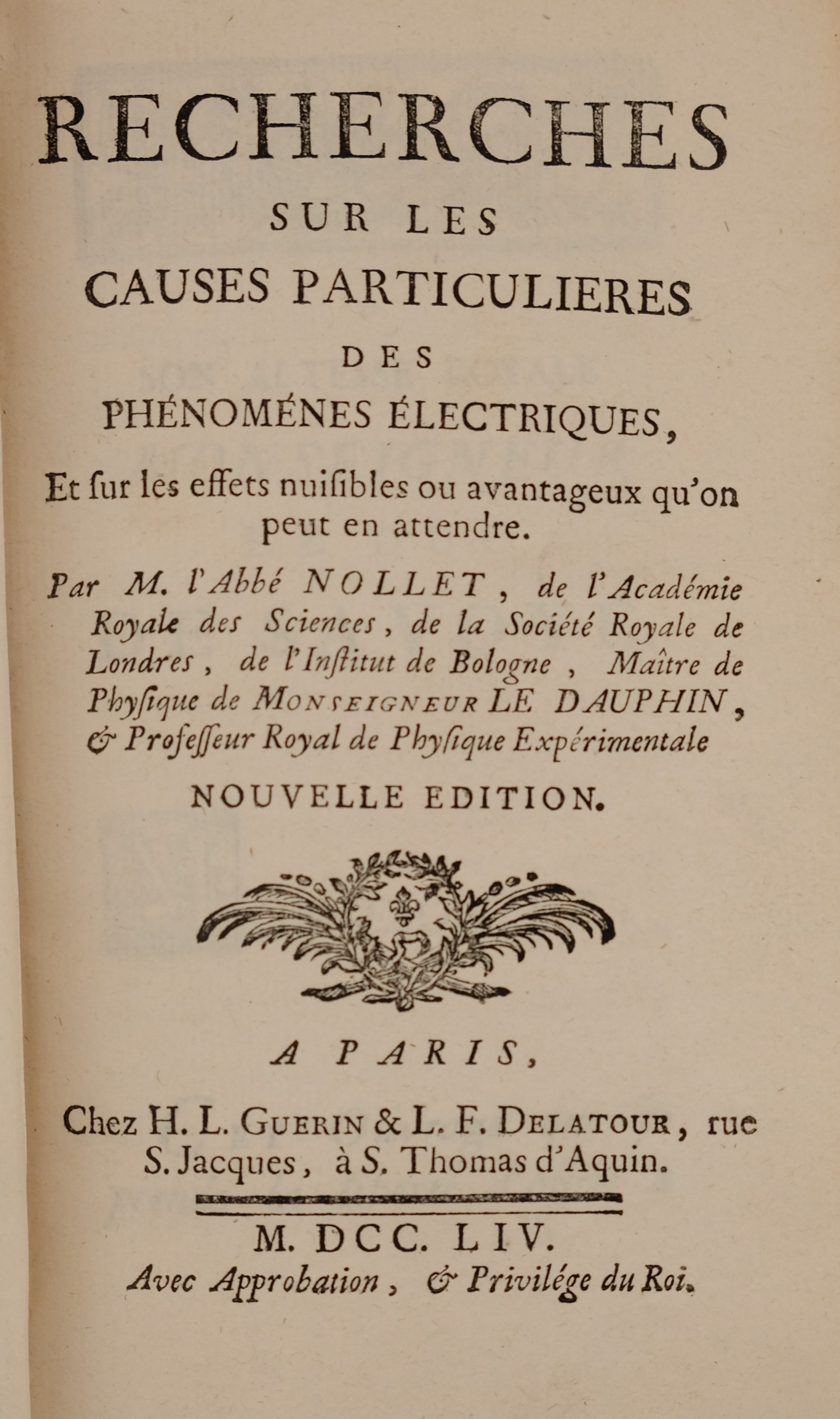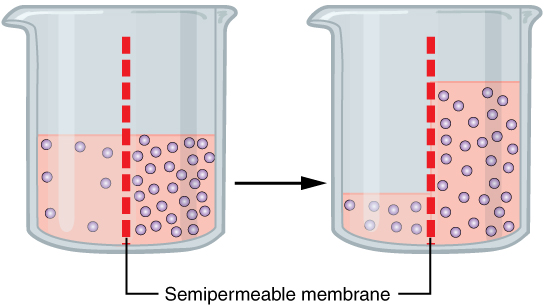|
Jean-Antoine Nollet
Jean-Antoine Nollet (; 19 November 170025 April 1770) was a French clergyman and physicist who conducted a number of experiments with electricity and discovered osmosis. As a deacon in the Catholic Church, he was also known as Abbé Nollet. Biography Nollet studied humanities at the Collège de Clermont in Beauvais, starting in 1715. He completed a master's degree in the Faculty of Theology at the University of Paris in 1724. He was ordained a deacon in the Catholic Church in 1728, but suspended his clerical career. However he used the title of Abbé throughout his life. Nollet was particularly interested in the new science of electricity. He joined the Société des Arts in 1728, an association which was reestablished from a previous version which ended in 1723. Formed under the patronage of Comte de Clermont, the Société focused on applying natural philosophy to practical arts. This association gave Nollet the opportunity to come into contact with important natural philosoph ... [...More Info...] [...Related Items...] OR: [Wikipedia] [Google] [Baidu] |
Osmosis
Osmosis (, ) is the spontaneous net movement or diffusion of solvent molecules through a selectively permeable membrane, selectively-permeable membrane from a region of high water potential (region of lower solute concentration) to a region of low water potential (region of higher solute concentration), in the direction that tends to equalize the solute concentrations on the two sides. It may also be used to describe a physical process in which any solvent moves across a selectively permeable membrane (permeable to the solvent, but not the solute) separating two solutions of different concentrations. Osmosis can be made to do Work (physics), work. Osmotic pressure is defined as the external pressure required to prevent net movement of solvent across the membrane. Osmotic pressure is a colligative properties, colligative property, meaning that the osmotic pressure depends on the molar concentration of the solute but not on its identity. Osmosis is a vital process in biology, bi ... [...More Info...] [...Related Items...] OR: [Wikipedia] [Google] [Baidu] |
Fellows Of The Royal Society
Fellowship of the Royal Society (FRS, ForMemRS and HonFRS) is an award granted by the Fellows of the Royal Society of London to individuals who have made a "substantial contribution to the improvement of natural science, natural knowledge, including mathematics, engineering science, and medical science". Overview Fellowship of the Society, the oldest known scientific academy in continuous existence, is a significant honour. It has been awarded to :Fellows of the Royal Society, around 8,000 fellows, including eminent scientists Isaac Newton (1672), Benjamin Franklin (1756), Charles Babbage (1816), Michael Faraday (1824), Charles Darwin (1839), Ernest Rutherford (1903), Srinivasa Ramanujan (1918), Jagadish Chandra Bose (1920), Albert Einstein (1921), Paul Dirac (1930), Subrahmanyan Chandrasekhar (1944), Prasanta Chandra Mahalanobis (1945), Dorothy Hodgkin (1947), Alan Turing (1951), Lise Meitner (1955), Satyendra Nath Bose (1958), and Francis Crick (1959). More recently, fellow ... [...More Info...] [...Related Items...] OR: [Wikipedia] [Google] [Baidu] |
Members Of The French Academy Of Sciences
Member may refer to: * Military jury, referred to as "Members" in military jargon * Element (mathematics), an object that belongs to a mathematical set * In object-oriented programming, a member of a class ** Field (computer science) In data hierarchy, a field (data field) is a Variable (computer science), variable in a record (computer science), record. A record, also known as a data structure, allows logically related data to be identified by a single name. Identifying relate ..., entries in a database ** Member variable, a variable that is associated with a specific object * Limb (anatomy), an appendage of the human or animal body ** Euphemism for penis * Structural component of a truss, connected by nodes * User (computing), a person making use of a computing service, especially on the Internet * Member (geology), a component of a geological formation * Member of parliament * The Members, a British punk rock band * Meronymy, a semantic relationship in linguistics * C ... [...More Info...] [...Related Items...] OR: [Wikipedia] [Google] [Baidu] |
Academic Staff Of The University Of Paris
An academy (Attic Greek: Ἀκαδήμεια; Koine Greek Ἀκαδημία) is an institution of tertiary education. The name traces back to Plato's school of philosophy, founded approximately 386 BC at Akademia, a sanctuary of Athena, the goddess of wisdom and skill, north of Athens, Greece. The Royal Spanish Academy defines academy as scientific, literary or artistic society established with public authority and as a teaching establishment, public or private, of a professional, artistic, technical or simply practical nature. Etymology The word comes from the ''Academy'' in ancient Greece, which derives from the Athenian hero, ''Akademos''. Outside the city walls of Athens, the gymnasium was made famous by Plato as a center of learning. The sacred space, dedicated to the goddess of wisdom, Athena, had formerly been an olive grove, hence the expression "the groves of Academe". In these gardens, the philosopher Plato conversed with followers. Plato developed his sessions ... [...More Info...] [...Related Items...] OR: [Wikipedia] [Google] [Baidu] |
18th-century Christian Abbots
The 18th century lasted from 1 January 1701 (represented by the Roman numerals MDCCI) to 31 December 1800 (MDCCC). During the 18th century, elements of Enlightenment thinking culminated in the Atlantic Revolutions. Revolutions began to challenge the legitimacy of monarchical and aristocratic power structures. The Industrial Revolution began mid-century, leading to radical changes in human society and the environment. The European colonization of the Americas and other parts of the world intensified and associated mass migrations of people grew in size as part of the Age of Sail. During the century, slave trading expanded across the shores of the Atlantic Ocean, while declining in Russia and China. Western historians have occasionally defined the 18th century otherwise for the purposes of their work. For example, the "short" 18th century may be defined as 1715–1789, denoting the period of time between the death of Louis XIV of France and the start of the French Revolution, ... [...More Info...] [...Related Items...] OR: [Wikipedia] [Google] [Baidu] |
French Abbots
French may refer to: * Something of, from, or related to France ** French language, which originated in France ** French people, a nation and ethnic group ** French cuisine, cooking traditions and practices Arts and media * The French (band), a British rock band * "French" (episode), a live-action episode of ''The Super Mario Bros. Super Show!'' * ''Française'' (film), a 2008 film * French Stewart (born 1964), American actor Other uses * French (surname), a surname (including a list of people with the name) * French (tunic), a type of military jacket or tunic * French's, an American brand of mustard condiment * French (catheter scale), a unit of measurement * French Defence, a chess opening * French kiss, a type of kiss See also * France (other) * Franch, a surname * French Revolution (other) * French River (other), several rivers and other places * Frenching (other) Frenching may refer to: * Frenching (automobile), recessing or moul ... [...More Info...] [...Related Items...] OR: [Wikipedia] [Google] [Baidu] |
French Physicists
French may refer to: * Something of, from, or related to France ** French language, which originated in France ** French people, a nation and ethnic group ** French cuisine, cooking traditions and practices Arts and media * The French (band), a British rock band * "French" (episode), a live-action episode of ''The Super Mario Bros. Super Show!'' * ''Française'' (film), a 2008 film * French Stewart (born 1964), American actor Other uses * French (surname), a surname (including a list of people with the name) * French (tunic), a type of military jacket or tunic * French's, an American brand of mustard condiment * French (catheter scale), a unit of measurement * French Defence, a chess opening * French kiss, a type of kiss See also * France (other) * Franch, a surname * French Revolution (other) * French River (other), several rivers and other places * Frenching (other) Frenching may refer to: * Frenching (automobile), recessing or mou ... [...More Info...] [...Related Items...] OR: [Wikipedia] [Google] [Baidu] |
1770 Deaths
Events January– March * January 1 – The foundation of Fort George, Bombay is laid by Colonel Keating, principal engineer, on the site of the former Dongri Fort. * February 1 – Thomas Jefferson's home at Shadwell, Virginia is destroyed by fire, along with most of his books. * February 14 – Scottish explorer James Bruce arrives at Gondar, capital of Abyssinia (modern-day Ethiopia) and is received by the Emperor Tekle Haymanot II and Ras Mikael Sehul. * February 22 – Christopher Seider, an 11-year-old boy in Boston in the British Province of Massachusetts Bay, is shot and killed by a colonial official, Ebenezer Richardson. The funeral sets off anti-British protests that lead to the massacre days later. * March 5 – Boston Massacre: Eleven American men are shot (five fatally) by British troops, in an event that helps start the American Revolutionary War five years later. * March 21 – King Prithvi Narayan Shah shifts to th ... [...More Info...] [...Related Items...] OR: [Wikipedia] [Google] [Baidu] |
1700 Births
As of March 1 (Old Style, O.S. February 19), where the Julian calendar acknowledged a leap day and the Gregorian calendar did not, the Julian calendar fell one day further behind, bringing the difference to 11 days until February 28 (Old Style, O.S. February 17), 1800. In Sweden, the year started in the Julian calendar and remained so until February 28. Then, by skipping the leap day, the Swedish calendar was introduced, letting Wednesday, February 28, be followed by Thursday, March 1, giving the entire year the same pattern as a common year starting on Monday, similar to the calendars of 2001, 2007, and 2018. This calendar, being ten days behind the Gregorian and one day ahead of the Julian, lasts until 1712. Events January–March * January 1 – Protestantism, Protestant nations in Western Europe, except Kingdom of England, England, start using the Gregorian calendar. Catholic Church, Catholic nations have been using the Gregorian calendar since its introduction in ... [...More Info...] [...Related Items...] OR: [Wikipedia] [Google] [Baidu] |
List Of Roman Catholic Scientist-clerics
A list is a set of discrete items of information collected and set forth in some format for utility, entertainment, or other purposes. A list may be memorialized in any number of ways, including existing only in the mind of the list-maker, but lists are frequently written down on paper, or maintained electronically. Lists are "most frequently a tool", and "one does not ''read'' but only ''uses'' a list: one looks up the relevant information in it, but usually does not need to deal with it as a whole".Lucie Doležalová,The Potential and Limitations of Studying Lists, in Lucie Doležalová, ed., ''The Charm of a List: From the Sumerians to Computerised Data Processing'' (2009). Purpose It has been observed that, with a few exceptions, "the scholarship on lists remains fragmented". David Wallechinsky, a co-author of '' The Book of Lists'', described the attraction of lists as being "because we live in an era of overstimulation, especially in terms of information, and lists help us ... [...More Info...] [...Related Items...] OR: [Wikipedia] [Google] [Baidu] |




